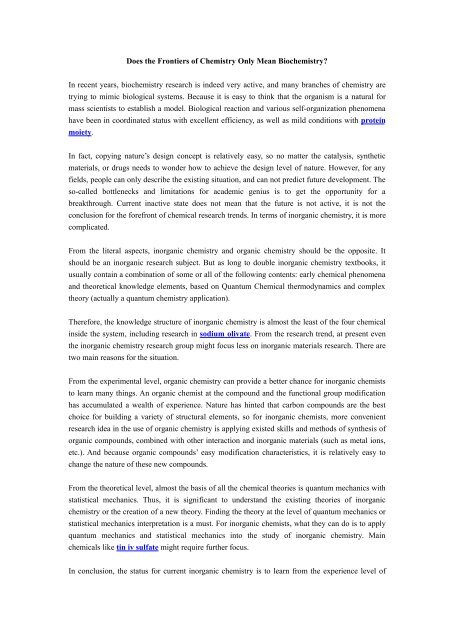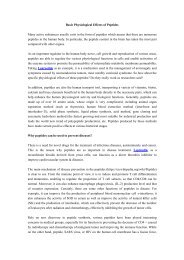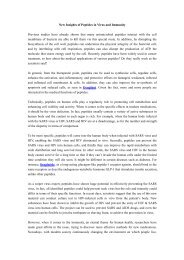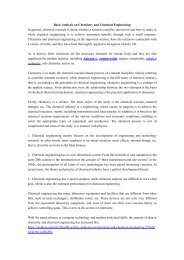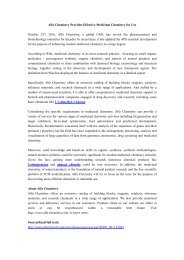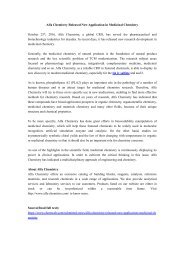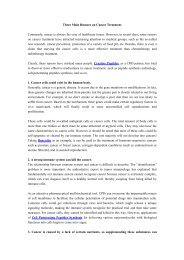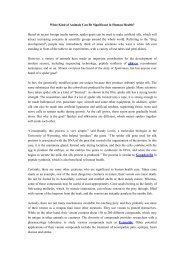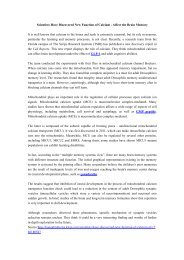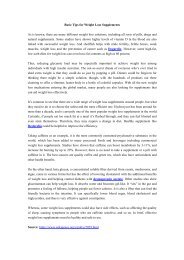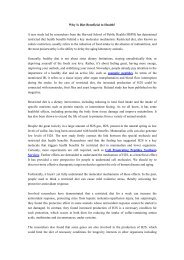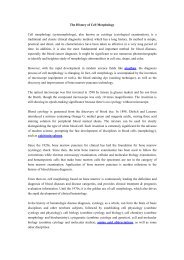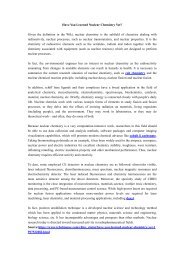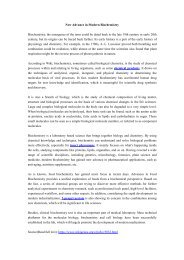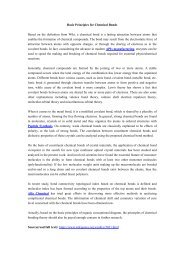Does the Frontiers of Chemistry Only Mean Biochemistry
Does the Frontiers of Chemistry Only Mean Biochemistry: http://www.alfa-chemistry.com/cas_61789-88-6.htm.
Does the Frontiers of Chemistry Only Mean Biochemistry: http://www.alfa-chemistry.com/cas_61789-88-6.htm.
Create successful ePaper yourself
Turn your PDF publications into a flip-book with our unique Google optimized e-Paper software.
<strong>Does</strong> <strong>the</strong> <strong>Frontiers</strong> <strong>of</strong> <strong>Chemistry</strong> <strong>Only</strong> <strong>Mean</strong> <strong>Biochemistry</strong>?<br />
In recent years, biochemistry research is indeed very active, and many branches <strong>of</strong> chemistry are<br />
trying to mimic biological systems. Because it is easy to think that <strong>the</strong> organism is a natural for<br />
mass scientists to establish a model. Biological reaction and various self-organization phenomena<br />
have been in coordinated status with excellent efficiency, as well as mild conditions with protein<br />
moiety.<br />
In fact, copying nature’s design concept is relatively easy, so no matter <strong>the</strong> catalysis, syn<strong>the</strong>tic<br />
materials, or drugs needs to wonder how to achieve <strong>the</strong> design level <strong>of</strong> nature. However, for any<br />
fields, people can only describe <strong>the</strong> existing situation, and can not predict future development. The<br />
so-called bottlenecks and limitations for academic genius is to get <strong>the</strong> opportunity for a<br />
breakthrough. Current inactive state does not mean that <strong>the</strong> future is not active, it is not <strong>the</strong><br />
conclusion for <strong>the</strong> forefront <strong>of</strong> chemical research trends. In terms <strong>of</strong> inorganic chemistry, it is more<br />
complicated.<br />
From <strong>the</strong> literal aspects, inorganic chemistry and organic chemistry should be <strong>the</strong> opposite. It<br />
should be an inorganic research subject. But as long to double inorganic chemistry textbooks, it<br />
usually contain a combination <strong>of</strong> some or all <strong>of</strong> <strong>the</strong> following contents: early chemical phenomena<br />
and <strong>the</strong>oretical knowledge elements, based on Quantum Chemical <strong>the</strong>rmodynamics and complex<br />
<strong>the</strong>ory (actually a quantum chemistry application).<br />
Therefore, <strong>the</strong> knowledge structure <strong>of</strong> inorganic chemistry is almost <strong>the</strong> least <strong>of</strong> <strong>the</strong> four chemical<br />
inside <strong>the</strong> system, including research in sodium olivate. From <strong>the</strong> research trend, at present even<br />
<strong>the</strong> inorganic chemistry research group might focus less on inorganic materials research. There are<br />
two main reasons for <strong>the</strong> situation.<br />
From <strong>the</strong> experimental level, organic chemistry can provide a better chance for inorganic chemists<br />
to learn many things. An organic chemist at <strong>the</strong> compound and <strong>the</strong> functional group modification<br />
has accumulated a wealth <strong>of</strong> experience. Nature has hinted that carbon compounds are <strong>the</strong> best<br />
choice for building a variety <strong>of</strong> structural elements, so for inorganic chemists, more convenient<br />
research idea in <strong>the</strong> use <strong>of</strong> organic chemistry is applying existed skills and methods <strong>of</strong> syn<strong>the</strong>sis <strong>of</strong><br />
organic compounds, combined with o<strong>the</strong>r interaction and inorganic materials (such as metal ions,<br />
etc.). And because organic compounds’ easy modification characteristics, it is relatively easy to<br />
change <strong>the</strong> nature <strong>of</strong> <strong>the</strong>se new compounds.<br />
From <strong>the</strong> <strong>the</strong>oretical level, almost <strong>the</strong> basis <strong>of</strong> all <strong>the</strong> chemical <strong>the</strong>ories is quantum mechanics with<br />
statistical mechanics. Thus, it is significant to understand <strong>the</strong> existing <strong>the</strong>ories <strong>of</strong> inorganic<br />
chemistry or <strong>the</strong> creation <strong>of</strong> a new <strong>the</strong>ory. Finding <strong>the</strong> <strong>the</strong>ory at <strong>the</strong> level <strong>of</strong> quantum mechanics or<br />
statistical mechanics interpretation is a must. For inorganic chemists, what <strong>the</strong>y can do is to apply<br />
quantum mechanics and statistical mechanics into <strong>the</strong> study <strong>of</strong> inorganic chemistry. Main<br />
chemicals like tin iv sulfate might require fur<strong>the</strong>r focus.<br />
In conclusion, <strong>the</strong> status for current inorganic chemistry is to learn from <strong>the</strong> experience level <strong>of</strong>
organic and biological systems; <strong>the</strong> <strong>the</strong>oretical level is dependent on quantum mechanics and<br />
statistical mechanics, which might lack <strong>of</strong> disciplines independence. But <strong>the</strong>re is no doubt that<br />
inorganic chemistry is still in advance process.<br />
Source(Read full text):<br />
https://medium.com/@ChloeMica/does-<strong>the</strong>-frontiers-<strong>of</strong>-chemistry-only-mean-biochemistry-14fd5<br />
224843a#.pebkuju7u


